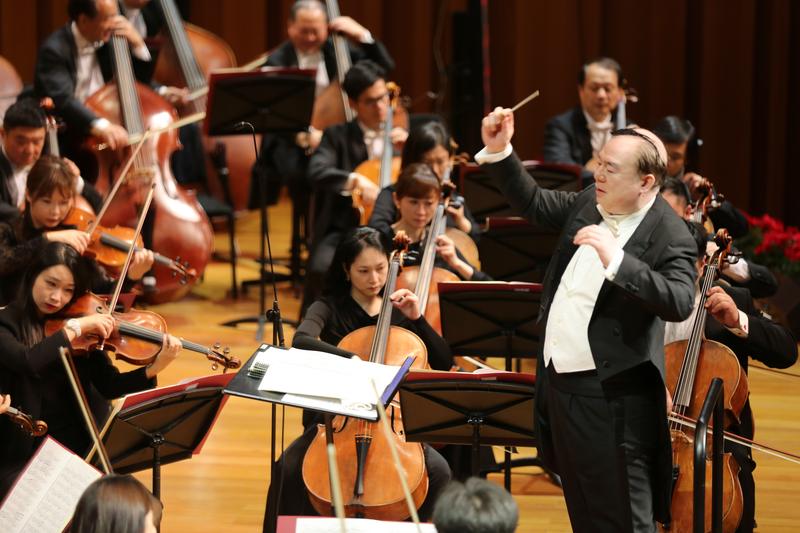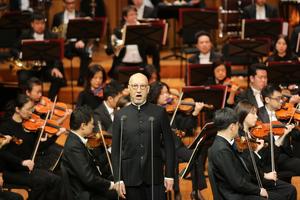Musicians celebrate Party's founding with inspiring pieces, Chen Nan reports.
 Conductor Yu Feng and the Shanghai Symphony Orchestra perform classic pieces and also introduce new works by Chinese composers at the National Center for the Performing Arts in Beijing on Thursday. (PHOTO PROVIDED TO CHINA DAILY)
Conductor Yu Feng and the Shanghai Symphony Orchestra perform classic pieces and also introduce new works by Chinese composers at the National Center for the Performing Arts in Beijing on Thursday. (PHOTO PROVIDED TO CHINA DAILY)
Chinese composer Yang Fan has a hectic, and rewarding, schedule. In 2019, he won two major prizes under the prestigious Wenhua Award. This is a top national award for the performing arts. He won for his compositions of two dance dramas: The Railway to Tibet and The Eternal Wave, during the 12th China Art Festival in Shanghai. Since then, the 37-year-old composer has received a number of invitations to compose for various music projects.
One of the commissions Yang received was to compose a piece for the Shanghai Symphony Orchestra, which marks the 100th anniversary of the founding of the Communist Party of China.
While celebrating what we’ve achieved today, we also need to review the past, especially the struggle we’ve experienced
Hao Weiya, professor, Central Conservatory of Music
"It's a very big subject and very challenging for a young composer like me. It's also a great honor," says Yang, who was born in Nanjing, Jiangsu province, and learned to play the piano at a very young age.
"Unlike words, music is abstract. With different musical instruments, a piece of music can express emotions and leave a space for the listeners to imagine," says Yang. "For the special occasion of celebrating the 100th birthday of the CPC, I think of the country's great achievement as well as people who made contributions to it."
After months Yang finished an 18-minute symphonic piece, titled The Fathers, in which he portrays his respect for the older generations who witnessed and contributed to the country's development.
On Thursday, the work made its debut at the National Center for the Performing Arts in Beijing, and was performed by the Shanghai Symphony Orchestra under the baton of conductor Yu Feng.
"It's a very personal piece because when I worked on it, the images of my father and my grandfather came to my mind. Many memories came back, such as old photos of my family and my grandfather, who died earlier this year, in his 90s," Yang adds.
In 1997, he enrolled to study at the middle school affiliated to the Shanghai Conservatory of Music with musicians, including Deng Erfu and Ju Wenpei. In 2002, Yang studied at the conservatory's composition department, where he graduated in 2008. In the same year, he traveled to Beijing to further his study at the Central Conservatory of Music, where he gained his master's degree in art in 2011. Now, he works as a composer with the China National Symphony Orchestra.
The composer says the music piece was also inspired by his composition for dance drama, The Eternal Wave, which was adapted from a classic 1950s film of the same title. Revolving around a Communist telegrapher who works undercover to fight enemies, the dance drama, directed by Zhou Liya, premiered in 2018 and has been staged more than 100 times nationwide.
Yang is among four composers whose works were premiered during the concert at the NCPA in Beijing on Thursday.
 Baritone Yang Xiaoyong sings Snow to the Tune at the concert. (PHOTO PROVIDED TO CHINA DAILY)
Baritone Yang Xiaoyong sings Snow to the Tune at the concert. (PHOTO PROVIDED TO CHINA DAILY)
According to Zhou Ping, director of the Shanghai Symphony Orchestra, the four music works were created by musicians born in the 1950s, '60s, '70s and '80s, representing the different perspectives on Communist belief from different generations. In December, excerpts of the four works had their debut rehearsals in Shanghai.
Let's Run to the Sea and Look up at the Starry Sky Together is a new music piece by Hao Weiya. Commissioned by the Shanghai Symphony Orchestra, the 50-year-old composer wrote the piece for soprano and symphony orchestra. It is also set to a poem, Believe in the Future by Guo Lusheng under the pen name Shi Zhi in 1968.
"While celebrating what we've achieved today, we also need to review the past, especially the struggle we've experienced. The new piece is intended to express the hope for a bright future," says Hao, a professor at the Central Conservatory of Music.
Another piece, which was premiered at the concert on Thursday was Ode to China composed by Yu Yang, which opened with a trumpet solo performance and combined music elements from the classic Chinese revolutionary song, Dongfang Hong (The East Is Red). As the composer describes, the use of trumpet is a metaphor for heroes who fought for the founding of the People's Republic of China in 1949.
Other music works performed during the concert at the NCPA included composer Lyu Qiming's Ode to the Red Flag, composer Tian Feng's Qin Yuan Chun Xue (Snow to the Tune), and The Story of Spring composed by Wang Yougui.
According to Zhou Ping, besides the three works premiered at the NCPA, composer Jia Daqun, 65, also completed a new concerto for the Shanghai Symphony Orchestra, titled A Heart Pursuing the Waves, which is part of the commissioned works marking the 100th anniversary of the founding of the CPC. Due to the limitation of the duration of the concert, the new piece will be premiered in Shanghai in late April.
"It's the first time for us to commission four Chinese composers to write musical works with the same theme. The four Chinese composers, though with different ages and different backgrounds, expressed their own feelings and respect for the country and the people," says Zhou.
From April 29 to May 6, the four composers' musical works, along with classic Chinese music works, such as Ode to the Red Flag, will be staged nationwide with a tour going to Chinese cities, such as Hangzhou, Zhejiang province, Changsha, Hunan province and Wuhan, Hubei province. After the tour, the four new music works will be performed in Shanghai by the Shanghai Symphony Orchestra in June for two weeks.
As the oldest symphony orchestra in China, the Shanghai Symphony Orchestra, with a history dating back to 1879, has premiered some of the most famous Chinese music pieces, such as composer Lyu Qiming's Ode to the Red Flag, which was performed by the orchestra in 1965 in Shanghai.
Zhou says besides concerts, audiences will also become a part of the tour by leaving their messages on installations designed for the concerts, which review and tell stories about classic Chinese music works since 1949.
Contact the writer at chennan@chinadaily.com.cn


